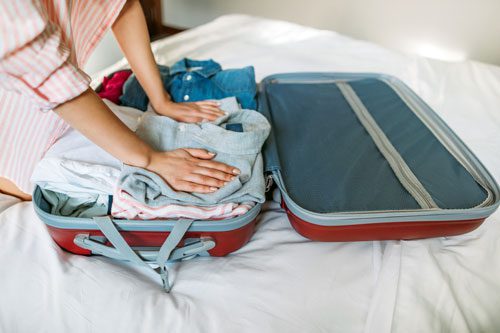
Entering residential treatment for a substance use disorder provides you with a fresh start to the next chapter of your life.
Packing for your stay shouldn’t be difficult, but it’s important to keep in mind that certain items are prohibited.
Items to Leave at Home
Contraband items are those that either conflict with treatment goals or pose a safety hazard. Bags are checked for contraband as part of the admissions process.
Each facility has slightly different rules, but items specifically banned by Waypoint Recovery Center include:
- Drugs, alcohol, and prohibited medication: Since abstinence is necessary for sobriety, all addictive substances will be considered contraband. Cigarettes or e-cigs are allowed, but they must be maintained by staff members. Over-the-counter medications are only allowed if they are unopened and you have staff approval.
- Guns, knives, or other weapons: Emotions can run high as you adjust to sobriety and some individuals may struggle with thoughts of self-harm or suicide. Keeping the facility free of anything that could be used as a weapon ensures everyone’s safety.
- Toiletries and beauty products that contain alcohol: Mouthwash, perfume, and other personal items containing alcohol are not allowed due to the potential for misuse.
- Nail polish, polish remover, or synthetic nail related products: These items can be misused as inhalants.
- Cleaning products: In addition to being unnecessary, bleach, ammonia, and other common cleaning products have the potential for misuse.
- Outside food and drinks: Since good nutrition is a vital part of the healing process, meals are carefully planned to provide you with the nutrients your body needs. If you have specific dietary needs due to allergies or other concerns, discuss this with your counselor.
- Video games, DVDs, sporting equipment, playing cards, and other recreational items: Activities will be planned to promote sober living recreational skills, so there’s no need to worry that you’ll bored during your stay.
- Electronics that require Internet usage or have cameras: Communication with the outside world is monitored during your stay to allow you to focus on your recovery. Cameras are not allowed to protect the privacy of other residents.
- Pornography: Pornographic materials are not allowed due to the risk of replacing substance abuse with a sex addiction.
- Revealing clothing or clothing with profanity or references to drugs, alcohol, or violence: Modest and comfortable attire is encouraged to set an environment of mutual support and respect.
- Candles and incense: Unfortunately, these items are a safety hazard in a group environment.
As you’re packing your bags, you should also keep in mind that space is somewhat limited. Packing light is strongly encouraged.
What to Pack
Now that you know what to leave at home, here’s a list of essentials to back:
- Basic clothing: You should bring seven days worth of clothing. This includes shoes, shirts, pants, socks, undergarments, pajamas, bathrobe, slippers, and a seasonally appropriate jacket.
- Personal hygiene and beauty items: This includes a 30-day supply of items such as soap, toothpaste, hairstyling products, sunscreen, and feminine hygiene products.
- Cash: It’s recommended that you bring $50 to $100 in smaller bills for store runs, outings, and other expenses.
- Credit card or debit card: You may need these to pay for treatment medications.
- Identification: Acceptable forms of identification include a driver’s license, passport, state-issued ID card, etc.
- Insurance card: You’ll be asked to provide your insurance information when you check into the facility.
- Contact information for your support system: If there are specific people you want to have involved in your treatment, you will need to provide their names, addresses, and phone numbers. This includes friends, family, 12 step sponsors, and current healthcare providers.
- Applicable prescription medication: If appropriate, bring your current prescription medication in the original bottle with the information label intact as well as a list of your medications and the necessary dosages.
Optional items include:
- Jewelry: Valuable items should generally be left at home, but you may choose to bring your wedding ring, watch, or other jewelry that you normally wear everyday.
- Stationary and stamps: Communicating with loved ones via letters can help repair damaged relationships and strengthen your recovery support system.
- Personal pictures: Photos of your loved ones to keep in your room can help you stay motivated and focused on your recovery.
- Alarm clock: If you prefer to wake up at a certain time, you can bring an alarm that does not have a radio.
When in Doubt, Just Ask
If there is a specific item you wish to bring, but aren’t sure is allowed, it’s best to simply ask. Waypoint Recovery Center is committed to making sure your stay is as comfortable as possible.





